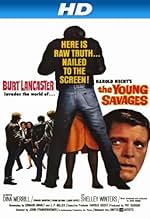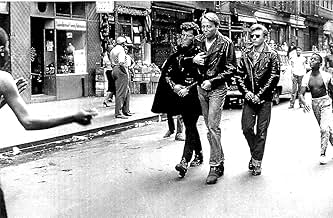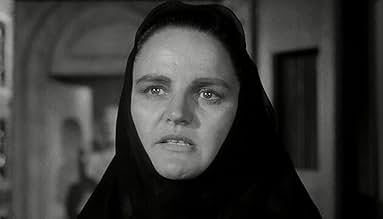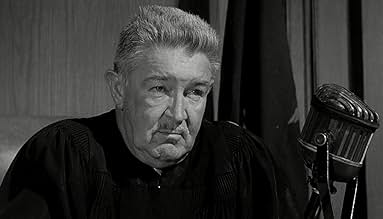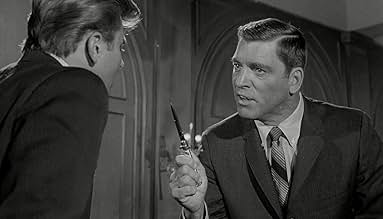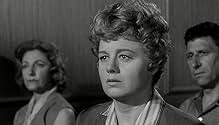IMDb रेटिंग
6.9/10
3.2 हज़ार
आपकी रेटिंग
अपनी भाषा में प्लॉट जोड़ेंA district attorney investigates three white teenagers accused of murdering a blind Puerto Rican kid.A district attorney investigates three white teenagers accused of murdering a blind Puerto Rican kid.A district attorney investigates three white teenagers accused of murdering a blind Puerto Rican kid.
- निर्देशक
- लेखक
- स्टार
Neil Burstyn
- Anthony 'Batman' Aposto
- (as Neil Nephew)
José Pérez
- Roberto Escalante
- (as Jose Perez)
फ़ीचर्ड समीक्षाएं
The Young Savages (1961)
Released six months before "West Side Story," this elegant story of New York gang violence in the ghettos of uptown Manhattan is as powerful, and as beautiful. And the title makes clear that the movie is pointing to a new social problem, the immigrant gangs (Italian and Puerto Rican in this case). But in most ways "The Young Savages" couldn't be more different.
At the heart of it all is district attorney Hank Bell, previously Bellini, played by Burt Lancaster in what struck me as possibly the most subtle role in his career. That's an absurd thing to know for sure, and Lancaster is so good so often it's easier to just say he is terrific, but if you know him from some noir films or from "Birdman of Alcatraz" or "Judgement at Nuremberg" you might know a more overtly dramatic actor. Here he is restrained in a perfect way, his pauses and his turned head adding depth to his apparent struggle with how to get at the truth as the events and the witnesses start to swirl out of control. A virtuosic performance.
The themes are hot topic issues layered with good old fashioned love and loyalty. Mostly we have first and second generation immigrant trying to define themselves, to stake out a place in the city, and to fend off competing immigrant groups and sometimes invade their territory. Bell's own Italian-American background makes him understand the problems of youth violence from the inside, but he has avoided being identified as Italian, and even his wife doesn't quite accept him as an immigrant, but wants to see him as more like her, a Vassar girl. Which he is not, even if sometimes he passes as a Yankee or as an old stock New Yorker.
Much of the movie is that wonderful quite and deliberate investigation of the crime, the facts, the witnesses, the evidence. And we see this through Bell's eyes. The last long section is pure courtroom drama, and it's as good as courtroom dramas get, gutsy and tense. In the biggest sense, real justice is achieved, even at the expense of some reputations or expectations around the D.A. (who of course is supposed to always want and get the death penalty). By the final turns of events, you see the story is really about a single man who struggles against his own bias and does the right thing, and does it well. Director John Frankenheimer once again pulls off a movie with social significance that doesn't forget it's roots in theatrical drama.
Cinematographer Lionel Lindon is an old pro, starting with some 1940s boilerplate movies sprinkled with some gems ("The Blue Dahlia" is a great one) and then scores of television shows. And the next year, 1962, he shot "The Manchurian Candidate" which succeeds partly for its amazing visual pizazz. Here, there are both moments of beauty and of cacophony. The fight scenes, and the dazzling murder that starts the movie off, are mini-masterpieces. But even quiet moments are given anxiety and drama by shooting at sharp angles or by moving in close. It's quite a beautiful experience to watch this, even as the events are tumultuous.
Released six months before "West Side Story," this elegant story of New York gang violence in the ghettos of uptown Manhattan is as powerful, and as beautiful. And the title makes clear that the movie is pointing to a new social problem, the immigrant gangs (Italian and Puerto Rican in this case). But in most ways "The Young Savages" couldn't be more different.
At the heart of it all is district attorney Hank Bell, previously Bellini, played by Burt Lancaster in what struck me as possibly the most subtle role in his career. That's an absurd thing to know for sure, and Lancaster is so good so often it's easier to just say he is terrific, but if you know him from some noir films or from "Birdman of Alcatraz" or "Judgement at Nuremberg" you might know a more overtly dramatic actor. Here he is restrained in a perfect way, his pauses and his turned head adding depth to his apparent struggle with how to get at the truth as the events and the witnesses start to swirl out of control. A virtuosic performance.
The themes are hot topic issues layered with good old fashioned love and loyalty. Mostly we have first and second generation immigrant trying to define themselves, to stake out a place in the city, and to fend off competing immigrant groups and sometimes invade their territory. Bell's own Italian-American background makes him understand the problems of youth violence from the inside, but he has avoided being identified as Italian, and even his wife doesn't quite accept him as an immigrant, but wants to see him as more like her, a Vassar girl. Which he is not, even if sometimes he passes as a Yankee or as an old stock New Yorker.
Much of the movie is that wonderful quite and deliberate investigation of the crime, the facts, the witnesses, the evidence. And we see this through Bell's eyes. The last long section is pure courtroom drama, and it's as good as courtroom dramas get, gutsy and tense. In the biggest sense, real justice is achieved, even at the expense of some reputations or expectations around the D.A. (who of course is supposed to always want and get the death penalty). By the final turns of events, you see the story is really about a single man who struggles against his own bias and does the right thing, and does it well. Director John Frankenheimer once again pulls off a movie with social significance that doesn't forget it's roots in theatrical drama.
Cinematographer Lionel Lindon is an old pro, starting with some 1940s boilerplate movies sprinkled with some gems ("The Blue Dahlia" is a great one) and then scores of television shows. And the next year, 1962, he shot "The Manchurian Candidate" which succeeds partly for its amazing visual pizazz. Here, there are both moments of beauty and of cacophony. The fight scenes, and the dazzling murder that starts the movie off, are mini-masterpieces. But even quiet moments are given anxiety and drama by shooting at sharp angles or by moving in close. It's quite a beautiful experience to watch this, even as the events are tumultuous.
"The Young Savages" is a social-conscience drama showcasing its star, Burt Lancaster, to good effect. Burt plays Hank Bell, a district attorney who is handed the case of three Caucasian youth gang members who murdered a Puerto Rican youth in cold blood. But is that what really happened? As Bell does a lot of his own sleuthing, he discovers, predictably enough, that things may not be as they appeared. He embarks on a bull headed quest for the "truth" of the matter.
Bell conducts himself in an unprofessional matter often enough, at least during the climactic trial, that it may lose some viewers due to lack of complete believability. But it's still a reasonably engrossing story, well told by screenwriters Edward Anhalt and J.P. Miller (based on the novel "A Matter of Conviction" by Evan Hunter) and director John Frankenheimer. Frankenheimer doesn't concern himself with being overly cinematic, concentrating mostly on just spinning this racially charged yarn. We are subject to some speechifying and philosophizing on the nature of criminal youth, and the nature of the justice system. For one thing, Hanks' wife Karin (Dina Merrill) is a bleeding heart liberal.
The main thing that really holds all of this together is an exceptional cast. Lancaster handles himself with great dignity, playing a character who considers himself fortunate to have escaped slum surroundings (partly due to his father changing the family name, which was actually Bellini). The film co-stars Edward Andrews, Vivian Nathan, Shelley Winters, Larry Gates, Telly Savalas (in his first substantial role), Pilar Seurat, and Milton Selzer, with juicy parts for the younger generation: Stanley Kristien as the defiant Danny, John Davis Chandler as the volatile Arthur, Neil Nephew as the none too bright Anthony, and Luis Arroyo as the passionate Zorro.
While not all that satisfying when all is said and done, "The Young Savages" is compelling enough to keep a viewer watching for 103 minutes.
Seven out of 10.
Bell conducts himself in an unprofessional matter often enough, at least during the climactic trial, that it may lose some viewers due to lack of complete believability. But it's still a reasonably engrossing story, well told by screenwriters Edward Anhalt and J.P. Miller (based on the novel "A Matter of Conviction" by Evan Hunter) and director John Frankenheimer. Frankenheimer doesn't concern himself with being overly cinematic, concentrating mostly on just spinning this racially charged yarn. We are subject to some speechifying and philosophizing on the nature of criminal youth, and the nature of the justice system. For one thing, Hanks' wife Karin (Dina Merrill) is a bleeding heart liberal.
The main thing that really holds all of this together is an exceptional cast. Lancaster handles himself with great dignity, playing a character who considers himself fortunate to have escaped slum surroundings (partly due to his father changing the family name, which was actually Bellini). The film co-stars Edward Andrews, Vivian Nathan, Shelley Winters, Larry Gates, Telly Savalas (in his first substantial role), Pilar Seurat, and Milton Selzer, with juicy parts for the younger generation: Stanley Kristien as the defiant Danny, John Davis Chandler as the volatile Arthur, Neil Nephew as the none too bright Anthony, and Luis Arroyo as the passionate Zorro.
While not all that satisfying when all is said and done, "The Young Savages" is compelling enough to keep a viewer watching for 103 minutes.
Seven out of 10.
Overall the film is not an 8 but the cool parts just won't allow me to give it a lower score.When it was first released I was in junior high school and there existed a non-conformist society within a society.These non-conformists wore long dark coats(trench coats ?) and small brimmed dress hats.My older brother used this kind of dress,I thought it looked so cool.The best I could do was a hand-me-down off white coat that had been balled up in the closet.My big head size ruled out using a hat,instead of looking like a teenage gangster I probably resembled a juvenile Colombo.In the film the gang called the Horsemen dress in the coat and hat style,I really could relate to this cool look.Real gang members are used for some parts of the movie.The viewer sees a style of dress that really existed at the time,for me it's history preserved.The slang and look of the young people are what I like about this movie.Among them are Zorro,Pretty Boy,Gargantua and Batman.The outstanding one and for me the scene stealer of the movie is Arthur Reardon one of the accused murders played by John Chandler.Although only involved in violence twice in the movie he goes about it gleefully as it escalates.A complex person he grins telling how he wanted to live on a farm but his parents put him out on the streets to play with bad boys.Most of the time he is sneering giving indication many things in the world annoy him.His character would have no trouble fitting into a current movie. Soundtrack is very good and in one scene sets the viewer up for seeing Diavolo for the first time.The back of his jacket is something else,be ready for it they only show it for a second. The big finale court trial is unbelievable,a fairytale.About the most realistic scene involving Burt Lancaster is when he is at home talking to his wife and reflects on changing his name from Bellini to Bell.Probably especially after one of the Italian gang members yells..What's the matter you ashamed of being a W--?.This is not a Burt Lancaster movie/story,changes were made to fit his image.When asked by a gang member..Do you know why I stomped him? Lancaster gives the correct answer to show his so called tough up bringing.In the book Lancaster's character can't give the answer and is more meek.The character in the movie still has to take a backseat to the young persons maybe all the way to the trunk.Look for the emphasis on poverty,one gang leader lives in a crowded apartment with people laying around. It looks like a combination flop house/sweat shop where sleeping is done in shifts.My favorite touch is a rooster pecking around on the stairwell INSIDE the apartment building(a housebroken slum rooster?)
The sixties were John Frankenheimer's heyday:he directed three classics "birdman from Alcatraz" "the Manchurian candidate " and "seconds" ,all unqualified musts for any cinebuff.
"Young savages " is at first sight ,a more realist "West Side Story" (the Thunderbirds and the Horsemen replacing the Jets and the Sharks),but hindsight shows that ,in the end ,Frankenheimer's work is not more convincing than Wise's -which has other assets anyway- ,as far as social depiction is concerned.The script promised great things.Which counts in favor of Frankenheimer is his impartiality:he never really sides with one of the groups.Some scenes are impressive :the first meeting Lancaster/victim's mother-but the second one gets in the way-,the murder seen thru glasses -which borrows from Hitchcock's "strangers on a train" though,the pack assaulting a young boy at the pool...The magpie syndrome comes back in the scene when Lancaster's wife is assaulted in the elevator :the same thing happened to Glenn Ford's wife in "blackboard Jungle" .
Some ideas or theories are dubious indeed:because Di Pace (what a name!) has a very high IQ -which is not obvious at all,considering his behavior and his conversation-,he might possibly be less guilty than the others.Ah ... and he is also Lancaster's former sweetheart's offspring !The last confrontation Lancaster/Di Pace is supposed to be an almighty fuss:but anybody past infancy has understood the "knife trick" long before the dialog ends.
"Young savages " is not a bad movie ;it's simply politically correct to the core,which the three works I mention above are not.That said ,there are enough surprises,unexpected twist ,and good performances (of course Shelley Winters outshadows Lancaster's bland wife)to sustain interest till the end.
"Young savages " is at first sight ,a more realist "West Side Story" (the Thunderbirds and the Horsemen replacing the Jets and the Sharks),but hindsight shows that ,in the end ,Frankenheimer's work is not more convincing than Wise's -which has other assets anyway- ,as far as social depiction is concerned.The script promised great things.Which counts in favor of Frankenheimer is his impartiality:he never really sides with one of the groups.Some scenes are impressive :the first meeting Lancaster/victim's mother-but the second one gets in the way-,the murder seen thru glasses -which borrows from Hitchcock's "strangers on a train" though,the pack assaulting a young boy at the pool...The magpie syndrome comes back in the scene when Lancaster's wife is assaulted in the elevator :the same thing happened to Glenn Ford's wife in "blackboard Jungle" .
Some ideas or theories are dubious indeed:because Di Pace (what a name!) has a very high IQ -which is not obvious at all,considering his behavior and his conversation-,he might possibly be less guilty than the others.Ah ... and he is also Lancaster's former sweetheart's offspring !The last confrontation Lancaster/Di Pace is supposed to be an almighty fuss:but anybody past infancy has understood the "knife trick" long before the dialog ends.
"Young savages " is not a bad movie ;it's simply politically correct to the core,which the three works I mention above are not.That said ,there are enough surprises,unexpected twist ,and good performances (of course Shelley Winters outshadows Lancaster's bland wife)to sustain interest till the end.
John Frankenheimer directs this intense story of three teenage killers in New York City's Spanish Harlem and the idealistic DA(Burt Lancaster)given the job to prosecute them. Young gang members trying to protect their turf see no use in cooperating with the law. Lancaster plays the part as if he were Jack Webb. (That is meant to be a compliment). This movie also gives Lancaster the chance to work with Shelley Winters. (Wink, wink) Also in the cast are Dina Merrill, Chris Robinson, Edward Andrews and the debut of Telly Savalas. Very little actual violence, but some pretty good drama.
क्या आपको पता है
- ट्रिवियाDuring the commentary she did for the DVD of What Makes Sammy Run?: Part 1 (1959) Dina Merrill said that the treatment she received from director John Frankenheimer on this picture nearly drove her out of the business. He told her at the end of a day's filming that she was the worst actress he'd ever worked with. She said she went home in tears. It got so bad that her co-star Burt Lancaster came to her defense one morning by ridiculing the director's "good mood" as evidenced by the fact that he hadn't insulted Dina yet.
- गूफ़After Hank Bell is attacked by the gang in the subway car, the next shot opens with the doctor in the emergency room examining a chest x-ray that is obviously reversed.
- भाव
Danny diPace: Don't con me Mr. Bell. Bell! Your name's Bellini, and you're a wop just like me! What's a-matter, Mr Bellini, you're ashamed of being a wop?
टॉप पसंद
रेटिंग देने के लिए साइन-इन करें और वैयक्तिकृत सुझावों के लिए वॉचलिस्ट करें
- How long is The Young Savages?Alexa द्वारा संचालित
विवरण
- रिलीज़ की तारीख़
- कंट्री ऑफ़ ओरिजिन
- भाषाएं
- इस रूप में भी जाना जाता है
- A Matter of Conviction
- फ़िल्माने की जगहें
- Fulton Fishmarket, Fulton Street, मैनहटन, न्यूयॉर्क शहर, न्यूयॉर्क, संयुक्त राज्य अमेरिका(Bell and Gunderson go to see Angela and her father who works there)
- उत्पादन कंपनी
- IMDbPro पर और कंपनी क्रेडिट देखें
- चलने की अवधि1 घंटा 43 मिनट
- रंग
- पक्ष अनुपात
- 1.85 : 1
इस पेज में योगदान दें
किसी बदलाव का सुझाव दें या अनुपलब्ध कॉन्टेंट जोड़ें



